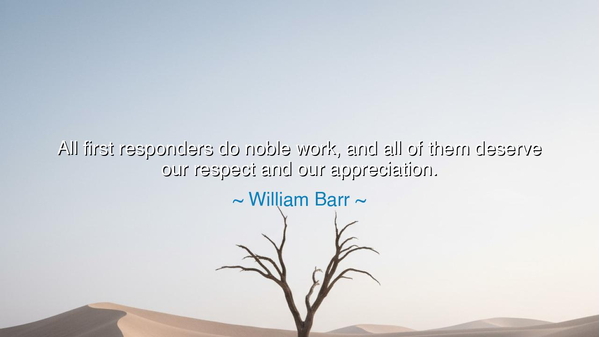
All first responders do noble work, and all of them deserve our
All first responders do noble work, and all of them deserve our respect and our appreciation.






When William Barr proclaimed, “All first responders do noble work, and all of them deserve our respect and our appreciation,” he spoke words that echo with the gravity of ages. His statement is not bound by the politics of his time, but by an eternal principle: that those who run toward danger when others flee embody the highest form of service. It is a reminder that courage is not measured in medals, but in the unseen moments when lives are saved, when chaos is faced head-on, and when sacrifice is quietly made for the sake of strangers.
The first truth he names is that the work of first responders is noble. Firefighters rushing into burning homes, police officers standing in the breach against violence, paramedics bending over the wounded—all of these embody the spirit of selflessness. Nobility here is not a title inherited by birth, but a virtue earned in sweat, danger, and compassion. They place the safety of others above their own, and in so doing, they reflect the ancient warrior’s code: to protect the weak and preserve the order of society.
The second truth lies in his call for respect and appreciation. Too often, the work of first responders is seen only in fleeting headlines, in passing gratitude, or in the anonymity of a siren fading in the distance. But Barr’s words remind us that their labor is constant, their risks daily, and their burdens often unseen. Respect is more than applause; it is the acknowledgment of sacrifice. Appreciation is more than thanks; it is the commitment to honor their service through support, care, and remembrance.
History gives us a vivid example in the events of September 11, 2001. On that terrible day, when towers fell and the world seemed to crumble, thousands of first responders in New York City climbed stairs into smoke and fire, knowing the risk but refusing to turn back. Many did not return, yet their courage saved countless lives. Their memory remains a testament to Barr’s truth: nobility is not in words spoken from podiums, but in lives laid down in the service of others.
The deeper meaning of the quote is that service to others defines true greatness. In every society, there are those who wield wealth, those who wield power, and those who wield fame. Yet it is the first responder—often nameless, often unnoticed—who wields courage in the rawest sense. They remind us that civilization is held not only by laws and leaders, but by those who, in the hour of need, put themselves in harm’s way to preserve the lives of others.
For us, the lesson is profound: we must cultivate respect not only in thought, but in action. Support the men and women who serve in these roles. Extend gratitude when you meet them, and honor their sacrifices by building communities of safety, kindness, and solidarity. Teach the young that these are the true heroes, not those who seek glory for themselves, but those who silently serve others.
Practical wisdom follows: when you hear the siren, pause and remember the courage of those on the way to danger. When you see a firefighter, a medic, or an officer, speak gratitude aloud. Support policies and causes that strengthen their training, their well-being, and their families. And above all, embody their spirit in your own life—choose to serve, to protect, to uplift, even in small ways. For nobility is not theirs alone; it is a calling offered to all who put others before themselves.
Thus, William Barr’s words endure as a guiding flame. All first responders do noble work. All deserve respect. All deserve appreciation. Let us then not only say this with our lips, but live it with our actions, honoring them by building lives and communities worthy of their sacrifice. In this way, we join their nobility, and our gratitude becomes more than words—it becomes legacy.






AAdministratorAdministrator
Welcome, honored guests. Please leave a comment, we will respond soon